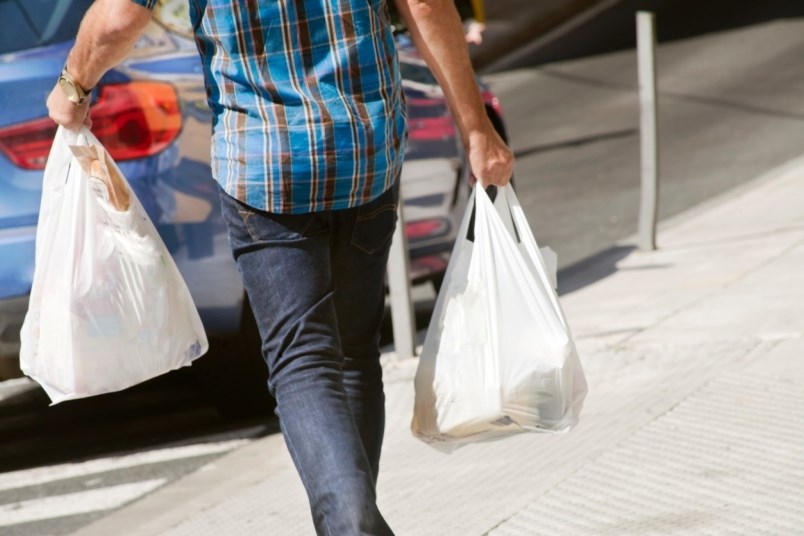The bylaws will still be in place Jan. 1, 2021 but staff wants city council to amend the bylaws to change the enforcement date to Jan. 1, 2022, effectively giving businesses a year to adapt to new requirements for bags and cups.
“While the business community generally supports the city’s single-use item bylaws, they have recently expressed significant concerns regarding the timing of enforcing the bylaw requirements associated with shopping bags and disposable beverage cups,” said the report which goes before city council Dec. 9.
“Many in Vancouver’s food and retail sectors are under financial pressure and any enforcement of bylaw requirements is expected to further compound this hardship.”
All businesses, charities, and non-profits that hold a business licence in Vancouver are required to comply with the shopping bag bylaw. That includes, but not limited to, grocery stores, restaurants, bakeries, delis, coffee shops, concessions, second-hand stores, street vendors and vendors at festivals, special events and markets.
All food vendors with a business licence must also comply with the disposable cup bylaw, which means charging customers at least 25 cents per cup. The price will be required to be displayed on menus, including online ordering platforms.
City staff recommended the one-year grace period for enforcement of both bylaws after hearing from Restaurants Canada, the BC Restaurant and Food Services Association, the Retail Council of Canada, along with large chains and small businesses.
Concerns cited included:
• Reduced revenues and increased costs related to complying with COVID-19 health requirements.
• In many cases, operations are reduced to a bare minimum and all efforts are directed toward keeping a business going while adapting to the pandemic and recent enhanced provincial restrictions.
• Many businesses have little to no capacity to determine new compliance requirements or cover additional costs for sourcing alternative bags and cups, setting up point-of-sale systems to charge fees and track the number of shopping bags and disposable cups distributed, updating menus and signs or training staff.
• Staff shortages and reduced staff availability due to the pandemic make it challenging to maintain a core level of properly trained staff. Implementing new systems that require additional staff training adds to this challenge.
• Many retailers subject to the shopping bag bylaw have experienced a decline in customers due to the pandemic. As a result, their plastic shopping bag supplies are expected to last longer than usual.
• The Retail Council and individual businesses have indicated some operators cannot afford to buy new paper shopping bags to replace the plastic ones.
• Supply chain issues due to the pandemic are resulting in a lack of availability of paper shopping bags manufactured with 40 per cent recycled content, as required in the bylaw. Small businesses in particular are having difficulty sourcing these shopping bags, and the limited supply has significantly increased their cost.
• Businesses are concerned about making bulk purchases of paper bags when their future is uncertain.
The ban on plastic shopping bags, including those that are compostable, means retailers will have to charge customers at least 15 cents for a paper shopping bag. That fee will climb to 25 cents after the first year.
The paper bags must be at least 40 per cent recycled content and retailers will be required to report annual bag distribution to the city, if asked. Exemptions will be made for small paper bags for such uses as a person carrying prescriptions from a pharmacy or providing charitable food services.
Plastic shopping bags used to transport linens, bedding or other similar large items that cannot easily fit in a paper bag or reusable bag will still be allowed. Customers requiring a reusable shopping bag will have to pay a retailer at least $1.
“The city has worked for many years to build trust with the business community through the development of these bylaws,” the report said. “Proceeding with the implementation of the shopping bag and cup bylaws without adjusting the enforcement date risks the city losing the support of businesses with respect to Vancouver’s single-use item reduction goals.”
Bylaws covering polystyrene foam cups, foam takeout containers, plastic straws and single-use utensils took effect earlier this year. However, education, outreach and enforcement was paused in March in response to COVID-19, when city operations shifted to providing emergency and essential services.
The city’s website says every week that 2.6 million disposable cups and two million plastic shopping bags are thrown in the garbage in Vancouver [63 per cent of the bags are reused as garbage bags].
Cups and takeout containers make up about 50 per cent of all items collected in public waste bins and are a significant portion of litter on Vancouver streets, according to the city’s website.
@Howellings



